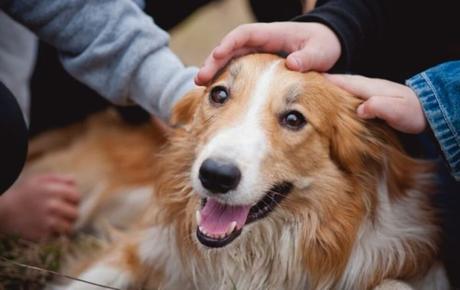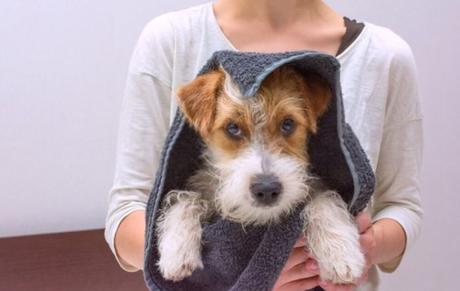You've heard it before, and you'll probably hear it again - a dog is a man's best friend. The unconditional love and companionship that a dog can provide are unparalleled by any other relationship. In order to make sure that the bond between you and your dog remains unbroken for years to come, it's important to pay attention to what their diet and care routine needs in order to keep them living a long, happy, and healthy life.
1. Types Of Food
The two main types of dog food, though, are wet and dry (aka kibble) foods, and they both have their pros and cons. However, in recent years there's been a lot of talk about the raw diet for dogs as well. When it comes to wet food - it usually comes in cans, the main pros are that it's very nutrient-rich and most dogs seem to love it. On the downside, it tends to be more expensive due to numerous factors, and you can't leave it out since it can spoil at room temperature. Dry food is often the more economical option, and it is suitable for free feeding. On the other hand, it often contains more calories than wet food, so you need to take extra care that your dog gets enough nutrients without consuming too many calories. Since it's not standardized, the raw diet is a much more complicated subject. Some of the main pros are that it's more natural, and you get to make sure that you only feed your dog the best ingredients out there.
On the other hand, it can be really difficult to strike the perfect balance of everything your dog needs in a meal. If this is something you're thinking about for your pet, the best thing you can do is try to learn as much about it as you can - there are plenty of online resources, and even talk to your vet and see what they have to say.

2. General Guidelines
One thing to keep in mind is that every dog is different. One dog may have an extremely fast metabolism while another seems to always be hungry. Not to mention that some dogs have special dietary requirements - some need hypoallergenic food, others need food designed for gastrointestinal issues, and others still need food that is especially rich in protein or carbohydrates for whatever reason. There are general guidelines that you can follow in order to choose the right type of food for your dog, but it's important to keep this in mind - every dog is different. Some of these include:
- Having a set time for meals - will help you stick to a healthy meal plan for your dog, and it will also teach them a certain degree of self-discipline, which is useful in the long run.
- Avoid overfeeding - some dogs have a tendency to gorge themselves, so it's important that you only give them enough food for their calorie and nutritional needs for the day
- Avoid physical activity after meals - for at least half an hour, you shouldn't let your dog run, jump, or do anything else that is too strenuous. Just like people shouldn't swim directly after meals, dogs need to relax after eating as well, to avoid potential complications.
- Keep an eye on their stool - it's not glamorous, but it's a sure-fire way to know if there is something wrong with your dog's diet.
You should feed your puppy at least three times a day, and gradually reduce the number of meals (while still providing them with enough food, of course) as they grow. Once they reach adulthood, you can give them one to two meals per day - depending on your dog's preferences and needs.
3. Socialization
One of the most important things to keep in mind when you're caring for your dog, besides proper diet, is socialization. Socialization for dogs is very important - it's what teaches them how to act towards other people, animals, and especially other dogs. Often this means taking them out to various places, meeting new people and dogs. However, there are some tips to socializing your dog that will make it easier for both of you in the long run - for instance:
- Keep their vaccinations up-to-date.
- Don't let them bond with only one person or animal - spread their attention around to different people/animals, and don't be afraid to mix and match (i.e. have your dog spend time with a friend's pets, or allow your dog to play with the neighbor's cat)
- Don't force them too much - if they seem overwhelmed or uncomfortable with everything around them, let them relax for a bit instead of pushing them into something new.
Slowly desensitizing your dog to different places and situations will make their life easier as well as yours, and you'll end up enjoying it so much more.

4. Keep Them Active
Just like people, dogs need to stay active in order to be healthy and happy. One of the best ways to keep them active is to take them out on long walks (and/or runs) regularly - it's a great way for both of you to get some exercise! However, if your dog isn't the type to enjoy long walks or runs, there are other ways to keep them active. For instance:
- Jog with them - some dogs just need a bit of time to warm up, but they'll enjoy the activity once they do!
- Swimming is great for keeping your dog active as well - it's good exercise and it doesn't put a lot of strain on their joints.
- Play with them - there are many games you can play with your dog to keep them active and entertained, such as fetch or frisbee. Just make sure it's something they enjoy!
Again, each dog is different and will need different levels of activity to stay healthy. As long as your dog is getting enough exercise and not putting too much strain on its joints, you can enjoy any activity together!
While not every dog needs extensive grooming, it's still important that you regularly brush your dog's coat/fur to keep it clean and healthy - especially if they're shedding year-round. Brushing their fur will increase the amount of time between baths as well as remove any loose hair from their fur that might cause allergies or skin irritation for both of you. You should brush their fur at least once a week - and more often if they're shedding year-round. Also check your dog's ears regularly for any signs of foul odor, redness, or other unusual developments that might indicate an infection. If you're ever unsure about something, your vet might be able to help - don't be afraid to ask them questions if you need to know more.
While there are plenty of other things that are just as important, these were some of the most prominent and most frequently overlooked. Diet and care routine affects nearly every aspect of your dog's life, so it's important you keep in mind everything that goes into your dog's routine and how it affects them.
RELATED POST: